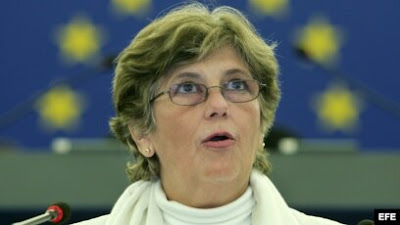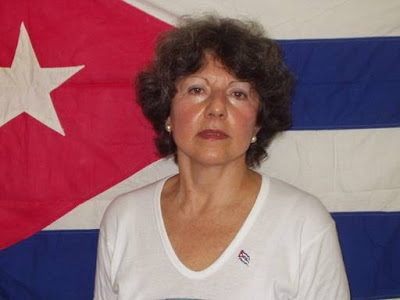 |
Protesters hold up Abajo Dictadura (Down with Dictatorship) banner
|
The Castro dictatorship's baseball team was defeated tonight 14-2 by the United States, Cuba's democratic resistance shattered the regime's narrative calling for an end to dictatorship, freedom for political prisoners, and these are both good things. However those complicit with the dictatorship in sport washing its true nature must also be held to account through non-violent means.
Major League Baseball (MLB) has repeatedly made two crucial mistakes, and tonight made a third.
First the
professional baseball organization has confused the Castro
dictatorship's junta with the Cuban people. Many others have made this mistake.
Second to highlight social justice issues in the United States, but ignore them outside the U.S., in places like China and Cuba to go into business with tyrants.
Third, the league compounded their first two errors, by attempting to censor free Cubans attending the World Baseball Classic semi-final tonight in Miami as the teams of the United States, and the Cuban dictatorship face off.
 |
No more communism!! misery!! dictatorship!!
|
The bad faith argument that Cuban exiles should not politicize the game ignores that this whole spectacle is a propaganda exercise of the Castro dictatorship. A former Cuban ball player called out the hypocrisy in the March 18, 2023 article by Nora Gámez Torres, "Cuba’s national baseball team’s game in Miami revives old political battles."
"Edilberto Oropesa, a former Cuban pitcher who played in Major League Baseball from 2001-04, said he doesn’t agree with those who have accepted the Cuban government’s invitation to join the national team. But said he respects their decision." “It’s a free country,” he told the Miami Herald.
He also believes that players on the island do not have much room to dissent if they have decided to stay and live there. “Those who made the Cuba team knew they had to do what they [government officials] say,” Oropesa added.
Last year, Oropesa and other Cuban exiles created the Association of Cuban Professional Baseball Players. They tried to assemble a team of Cubans playing in professional leagues worldwide that could represent the island at the World Baseball Classic.
But the WBC didn’t allow it because its rules grant such rights only to national federations. The former pitcher pushed back against those arguing that politics should not be brought into sports.
"They were the ones that brought in politics since 1959 when they took away professional baseball,” he said, speaking of the Cuban government. “It is something Machiavellian that they are doing for their interests ...
Totalitarian regimes politicize everything, especially sports to legitimize themselves, and mask their true nature. The Democratic resistance has a duty to counter them. Failing to do so, and allowing the regime narrative to dominate can be dangerous to freedom, and have far reaching and unexpected consequences.
The 1936 Olympics held in Berlin and hosted by the Nazi Germany with the ceremonies formally opened by Adolph Hitler should serve as a cautionary example. The United States Holocaust Memorial Museum described the impact of the games as follows:
On August 1, 1936, Hitler opened the XIth Olympiad. Musical fanfares
directed by the famous composer Richard Strauss announced the dictator's
arrival to the largely German crowd. Hundreds of athletes in opening
day regalia marched into the stadium, team by team in alphabetical
order. Inaugurating a new Olympic ritual, a lone runner arrived bearing a
torch carried by relay from the site of the ancient Games in Olympia, Greece.
[...] Concerted propaganda
efforts continued well after the Olympics with the international
release in 1938 of "Olympia," the controversial documentary directed by
German film maker and Nazi sympathizer Leni Riefenstahl.
She was commissioned by the Nazi regime to produce this film about the
1936 Summer Games. Germany emerged victorious from the XIth Olympiad.
German athletes
captured the most medals, and German hospitality and organization won
the praises of visitors. Most newspaper accounts echoed the New York Times report
that the Games put Germans "back in the fold of nations," and even made
them "more human again." Some even found reason to hope that this
peaceable interlude would endure.
The 1936 Olympics whitewashed the brutality of the Nazi regime in
Germany and led to the acceptance of Hitler's criminal regime.
The Olympic Committee learned nothing from this shameful episode and in 2008, and 2022 Olympics were held in Beijing that whitewashed the brutality of the genocidal Communist regime in China sport washing the criminal regime.
Western democracies in the 1930s could have been much tougher with Nazi, Germany and avoided the catastrophe of World War Two (WW2). This is why British Prime Minister and wartime leader Winston Churchill repeatedly called WW2, the unnecessary war.
In the preface to the first volume of his war memoirs, The Second World War, British Prime Minister and wartime leader Winston Churchill said:
“One day President Roosevelt told me that he was asking publicly for
suggestions about what the war should be called. I said at once ‘The
Unnecessary War.’ There never was a war more easy to stop than that
which has just wrecked what was left of the world from the previous
struggle.”
We do not yet know what the full consequences will be for humanizing the genocidal communist regime in China, but history does not give one cause for optimism.
It is unfortunate that Major League Baseball would not recognize the Association of Cuban Professional Baseball Players to play in the World Baseball Classic. It would have been wonderful to see what free Cuban baseball players could do in this competition, but they preferred to deal with Fidel Castro's son, Antonio Castro, who is in charge of Cuban baseball.
 |
Antonio Castro, the dictatorship's point man on baseball.
|
Former Cuban prisoner of conscience Regis Iglesias in an OpEd in Diario Las Américas on September 11, 2022 explained the context that has led to this protest.
..."The
MLB institution or the MLB Players Association come up with the idea of
allowing some franchises to visit Cuba for "friendly" matches or much
worse, to make "agreements" with who enslave not only our athletes, but
all our people. I will always protest and condemn those unsupportive
positions.
MLB cannot be a repressive extension of the Cuban Baseball Federation
and the criminal and segregationist regime in Cuba.
Rob
Manfred is not the owner of the farm like the commandos of the island
and he cannot pressure the players with simplistic reasoning and
opportunism to maintain the status quo with the tyranny or take shameful
steps of recognition of it." ...
"MLB's agreement with the Cuban Baseball Federation cannot be proudly
brandished as it is part of the recognition of an institution,
supposedly independent from a free country, to a repressive and
segregationist institution from a country subjected to the tyranny of a
communist party."
There is a long history of Major League Baseball's problematic relationship with the Castro regime. The Marlins in 2011 hired their manager Ozzie Guillen, who bragged about his love and respect for Fidel Castro and Hugo Chavez in a 2012 Time Magazine interview.
"I love Fidel Castro," Blurts Ozzie Guillen, the new manager of the
Miami Marlins, in his Jupiter, Fla., spring-training office before an
early-March team workout. [...] After a second of reflection, the most unfiltered figure in baseball, if
not sports, wants a do-over. "I respect Fidel Castro," says Guillen, a
Venezuela native who also says he respects Hugo Chvez. "You know why? A
lot of people have wanted to kill Fidel Castro for the last 60 years,
but that mother------ is still here."
He was suspended for five games, which was considered a slap on the wrist. He was fired a short time later for the unforgivable sin of having a losing season. Mr. Guillen has not grown wiser in the intervening years, but he does throw Bud Selig under the bus reminding everyone of the time the baseball chief attended a game in 1999 with Fidel Castro in Cuba. Selig himself reminisced about it in 2016 when the old dictator died.
 |
| Castro w/ Orioles owner Peter Angelos (l.) MLB's Bud Selig (r.) Cuba 1999 |
In 2016, Major League Baseball sent a proposal to the U.S. Treasury Department that would have turned Cuban baseball players into foreign workers of the Castro family while playing in the United States. This is not hyperbole, the point man that Major League Baseball was dealing with Antonio Castro, then vice president of the Castro regime's International Baseball Federation.
 |
Freedom for the political prisoners of the July 11th protests.
|
In 2018, after making their initial proposal, MLB was still trying to go into business with the Castro
family. Cuban baseball players would've been able to play in the Majors, but
at a cost. According to Reuters,
"MLB teams will pay the Cuban Baseball Federation a release fee for
each player to be signed from Cuba." This raised some questions. How big will this release fee be?
Will Cuban baseball players have to give up a big chunk of their
salaries, like Cuban doctors have had to do? The proposal was shot down by the Trump Administration.
Cuban baseball fans living in freedom need to boycott, and protest Major League Baseball, and let them know why.






























